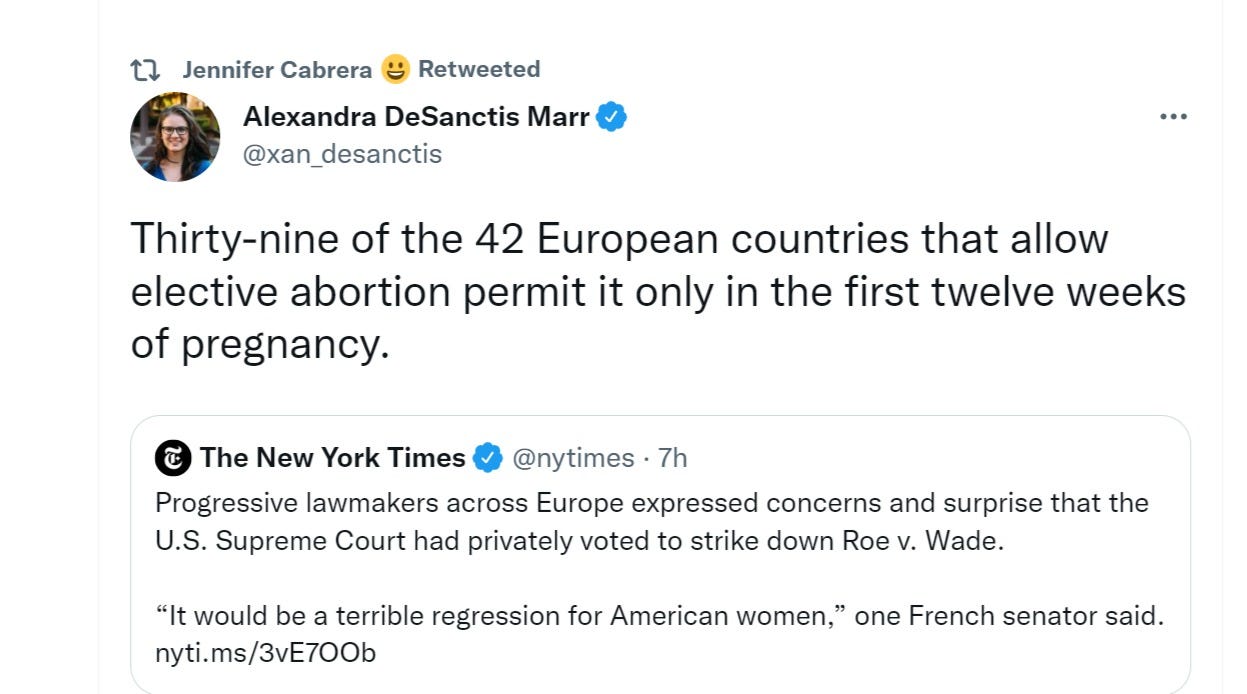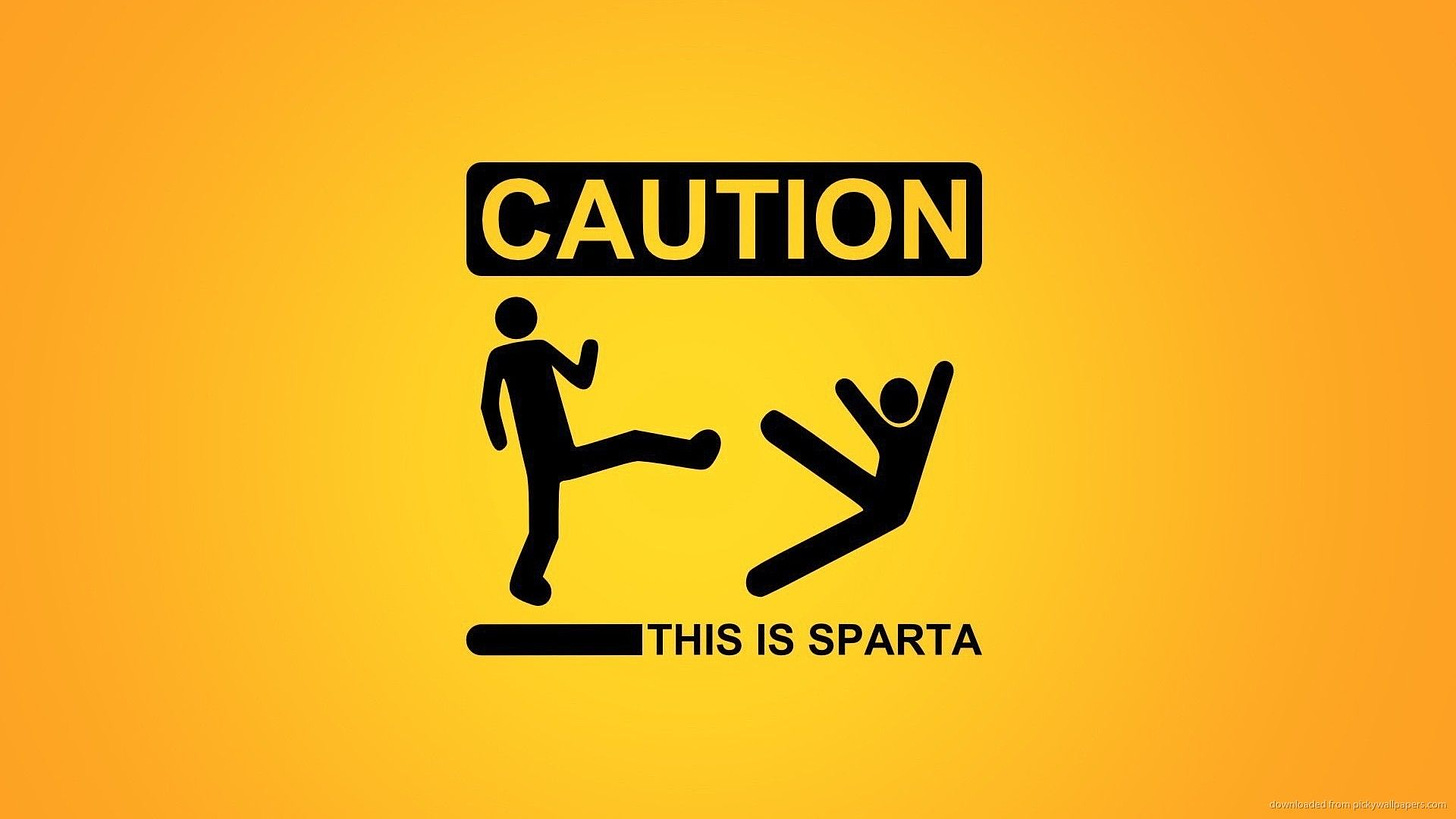i promised you more controversy. well, here is it.
if this makes you mad, just remember reasonable people can disagree and still be friends.
all ideas can be discussed.
any idea that cannot is a problem in and of itself.
and it’s certainly not going to get solved.
the third rail is live, and dinner is served.
this is an unsafe space.
as you likely heard, a draft of the majority opinion from the US supreme court on overturning roe v wade has leaked. the stakes on this are very high and abortion is one of the most loaded issues in US politics.
it’s going to be an epic round of high hypocrisy jersey changes and instant moral inversions of whose body is whose choice. the misrepresentation and recrimination will get aggressive to the point of frantic fabulism.
the salients of the matter, what happened, what anything actually means, and basic discernment will all go begging.
this is going to be a mess.
the simple fact is that few here even know the simple facts, much less complex contexts.
and this is why you cannot trust any of these people with choices of this convolution and magnitude.
they are politicians and pundits, what did you expect?
theirs is the predictable and inevitable twaddle and self-contradiction of those who reason not from precepts or ideals but from positions for which they then make up tactical pretext.
if we want solutions not slapfights, we need to take this upon ourselves.
rather than become lost in the rapid side-shifting of the food fight we should keep sight of the bigger picture and this first requires acknowledging something:
the alito opinion is actually quite a good decision.
you can read it HERE.
let’s be VERY clear:
i say this not to take a position on abortion.
i say this to take a position on the role of the judiciary.
and that’s a topic we REALLY do need to address.
i say this because roe v wade was an awful decision.
this was not because of its outcome (over which people can and do disagree, and with reason) but because the logic that underpinned it was shoddy and overreaching.
this faulty framing has left an issue of great import in a sort of limbo for generations.
for this reason, i have long said that anyone who was truly pro-choice should WANT to overturn roe. it’s just a terrible way to establish the boundaries and framework around such a choice.
i am far from alone in this.
even the much vaunted lioness of the left ruth bader ginsberg was an outspoken critic of roe despite, of course, being strongly pro-choice.
She would’ve preferred that abortion rights be secured more gradually, in a process that included state legislatures and the courts, she added. Ginsburg also was troubled that the focus on Roe was on a right to privacy, rather than women’s rights.
“Roe isn’t really about the woman’s choice, is it?” Ginsburg said. “It’s about the doctor’s freedom to practice…it wasn’t woman-centered, it was physician-centered.”
the whole underpinning of the purported right enumerated by roe is honestly something of a nonsense.
the ruling, in effect, created from whole cloth a positive “right to abortion” nowhere in evidence in the constitution by framing it as a sort of far flung privacy right around doctor patient interaction. (a right clearly trampled in many other places, particularly of late, and one not afforded to other professions)
not only did that constitute the sort of activist court over-reach that renders justices constitutional reframers cum philosopher kings, but it’s an inept framing of the right to boot and finds severe dissonance with the rest of the negative rights based structure that underpins a republic.
it’s not as though making a crime private renders it non-criminal. if a doctor helped a mother kill a 3 year old, would anyone accept this rationale?
This right of privacy, whether it be founded in the Fourteenth Amendment's concept of personal liberty and restrictions upon state action, as we feel it is, or ... in the Ninth Amendment's reservation of rights to the people, is broad enough to encompass a woman's decision whether to terminate her pregnancy.
— Roe, 410 U.S. at 15
The Court reasoned that outlawing abortions would infringe a pregnant woman's right to privacy for several reasons: having unwanted children "may force upon the woman a distressful life and future"; it may bring imminent psychological harm; caring for the child may tax the mother's physical and mental health; and because there may be "distress, for all concerned, associated with the unwanted child"[88]
this bad, uneasy elucidation has been political paydirt for 50 years. it’s an endless mess, hopelessly insecure, and inconsistent with 30 other areas of law and conscience.
whichever side of the issue you’re on, this ruling feels precarious, because the purported logic of it is nonsense and requires some sort of corkscrew-reasoning kabuki dance to follow and implement.
both parties LOVE that. the fact that this issue is eternally unstable and could turn on a dime (as perhaps it just did) is a feature, not a bug.
watch the current rage and outlandish exaggeration. this one always brings every bat in the belfry down from the rafters.
it’s evergreen fundraising fodder and get out the vote gold.
in an amusing foreshadowing of ketanji brown, the court 100% punted on the real meat of the matter:
We need not resolve the difficult question of when life begins. When those trained in the respective disciplines of medicine, philosophy, and theology are unable to arrive at any consensus, the judiciary, in this point in the development of man's knowledge, is not in a position to speculate as to the answer.
— Roe, 410 U.S. at 159
and left in its place a full blown grab bag of weasels.
A State may properly assert important interests in safeguarding health, maintaining medical standards, and in protecting potential life. At some point in pregnancy, these respective interests become sufficiently compelling to sustain regulation of the factors that govern the abortion decision. ... We, therefore, conclude that the right of personal privacy includes the abortion decision, but that this right is not unqualified and must be considered against important state interests in regulation.
— Roe, 410 U.S. at 154.
roe is an awful set of nonsensical and tortuous reasoning that sets up ill established competing interests and never defines any of its key terms. it was a cowardly attempt to reach a desired conclusion while not meaningfully resolving the matter.
whatever your take on this contentious issue, we have long deserved better.
since 1973, this issue has been deliberately left unsettled and uncertain because it suits the political ends of political parties. why create a real solution when so much ongoing benefit can be derived from a bad one?
and, as ever, we the people get held hostage by the extremist arm of both parties and their corner case competition to hurl moral opprobrium and absolutes because oh how donor money rolls in.
but most of us don’t live there.
most live somewhere in the middle.
this is not really all that controversial.
but trying saying it and see what happens.

amusingly, this is actually quite similar to what the trimester system in roe lays out as well as the widespread european solution. one might think saying so would be somewhat centrist in the overton window.
and mostly, i suspect it is. but the folks on the fringes will never let centrist dialogue occur and so we have no ability to speak calmly or reasonably on this hyper-politicized topic with hair trigger interest groups diametrically opposed to one another.
and it’s time we did.
so how do we fix it?
i see only one way: we have to do what the court failed to and define what a “person” is.
it’s that simple, which is to say, not simple at all because there is no objective answer that can be non-dogmatically asserted or proven.
nevertheless, we need to pick one.
this is a superlatively messy conversation that’s going to make A LOT of very vocal people unhappy. but then, these people are already unhappy and the rest are endlessly caught in their crossfire, so we might as well cowboy up and take a shot at actually resolving the issue for real.
contrary to a lot of ill informed histrionics, europe has mostly managed this by finding a societally accepted position and establishing a notion of “when life starts.”
so too can we.
i’m not going to do that here. i almost did, but honestly, i feel like it would occlude the other point i’m trying to make which is that is we the people and the representatives of our society and mores and must step up and shoulder this.
i do not want to lose that in the shouting over what the definition should be.
but this needs to be our conversation.
punting it to the courts as the unlucky seat in a game of hot potato and then lamenting that the courts are dictating our own morals to us is not a valid or viable stance to take.
that’s crying to mom then crying cuz she took your sister’s side of the argument.
you say want it solved?
so solve it.
we need a solution that takes the real salients into account.
it needs to foot and integrate with rules like manslaughter, murder, endangerment, neglect, and 20 other issues. and the only way to do that is to establish rights, who gets them, and when.
a person has rights, including the right not to be killed. these are real rights, foundational rights, which is to say, negative rights. it’s a right to be left alone, left unmolested.
this conflicts with other such negative rights like self-determination (such as a woman’s choice on pregnancy) but unless we’re going to go back to allowing infants to be left out for wolves or parents to leave 3 month old children to starve in a crib because “well, the baby could have gone out for lunch if he was hungry” we’re going to need to sort out what gets precedence. i suspect few seek a grant of full spartan style parental license there.
conversely, unless we’re going to start calling having a miscarriage at 10 weeks because you ran a 5k reckless endangerment and manslaughter, some latitude would seem to be in order.
it’s a big question:
what duty of care does a parent owe a child and when does this start?
let’s be clear: this is, by no means, objective. many societies, past and present, ascribe no such duty. leaving unwanted or malformed children to die has been historically common or even societally demanded in many cultures across time. proving objective rightness here on any given level of duty is probably impossible. the best we can do is say “these are the norms and values of our society and social contract.”
this brings us back to “so when is an unborn a person and therefore protected by this social contract?” as a means to determine when whatever duty is owed pertains.
we need something tangible, well defined, and deterministic.
we need a standard of “person” about which we can be clear and (reasonably) unambiguous.
we need a point at which human rights accrue to an entity (and pass from it as well when determining things like withdrawing life support).
no one is saying it’s easy, but if all the howling citizens and congresscritters alike really want to solve this issue for good and all, this is what needs doing.
politicians self-serving signal failure to do so is what has landed us in a situation like this where one court ruling can have such seismic effects.
but of course, we elected them, didn’t we? we didn’t hold their feet to the fire for a real solution. we let is slide and hoped the duct tape would hold or would give way or whatever your preference was.
it was our abrogation of duty over 50 years that set us up for this.
the court is right to punt this issue back at congress, the states, and thereby at us.
it should never have been decided by judges to begin with. it is neither the place nor purview of the judiciary to establish our social norms, morals, and mores.
establishing that seems like a turn toward a better orientation.
by mandate, SCOTUS assesses adherence to the constitution, defends rights, and limits the government to enumerated power.
in practice, we’ve played the craven and encouraged it to vastly exceed this to push what we feared to legislate.
but it is left to we the people, not they the judges to remake the constitution if such remaking is in order.
i’m not even sure the answer to this question CAN be legislated. to whom is such power granted and would we want them to have it if were? is this an issue we want up to future majority rule and to remain a hot potato in perpetuity?
congressional diktat underwritten by fragile majority position seems an unsound foundation on which to erect a durable right.
if we have to hold a constitutional convention and write a deterministic standard in once and for all, then let’s do it.
but enough screwing around and avoiding the responsibility.
and if you won’t stop screwing around, then stop asking me to take seriously how seriously you take this issue.
i won’t believe you.
if this is as important as everyone says it is, then let’s settle it.
to paraphrase the text of another truly awful ruling that has wreaked untold mischief through legislating from the bench:
“three generations of imbecility are enough.”












This issue is like immigration. They don’t want to solve it. They want to get the sides engaged and to turn out to vote every 2 years. That is why it was leaked now, as It appears the Democrats will lose Congress.
Completely aside from its subject matter, Roe was a terrible (and precarious) legal decision in the first place. If the pro-abortion politicians wanted to codify the right to abortion, they have had fifty years to do it properly via a federal law, and yet they have not. Why would you kill the goose that lays the golden outrage vote? The vote that you can tuck away in the back of the cupboard and pull out whenever it looks like your power might be in jeopardy.